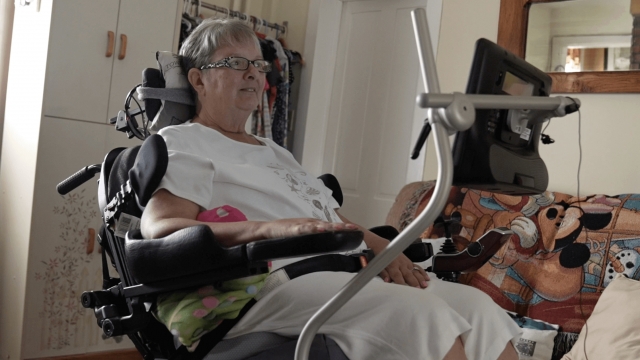Forty-nine years of marriage builds a bond that not even a disease like ALS can break.
"I can still understand her, basically," Butch Darlington said about his wife, Margie. "We're together 24-7, 365."
It's been roughly three years since Margie was diagnosed with ALS. Within the last year, she's progressively lost her ability to speak, but not her voice.
"Being able to preserve my own voice has been the best way of hanging on to something normal in my life," Margie says through a device connected to her wheelchair. The voice that comes from the device is a synthetic version of her own.
In September 2022, Margie did what is known as "voice banking." With the help of a speech pathologist, Margie recorded roughly 350 sentences that were then put into software that uses artificial intelligence to create a voice that sounds like her own.
"As my real voice continues to betray me with the regression of this horrible disease, I have an amazing opportunity to hold conversations in a meaningful way and in my original voice," Margie said.
SEE MORE: The Ice Bucket Challenge funded a major ALS gene breakthrough
When asked a question, Margie writes out an answer on a screen using eye-tracking technology. ALS has impacted her ability to move her arms, but doctors say the disease often doesn't impact eye movement as much.
"The first time we heard it, it was amazing that it sounded so much like her," Butch said. "You could tell it was a little bit robotic, but it didn't make any difference."
Speech pathologist Annie Roche worked with Margie to record her voice.
"I've been doing this voice and message banking for eight years now and it's really changed dramatically for the better in terms of ease of access and the quality," said Roche, who works for the nonprofit Bridging Voice.
The organization helps those with diseases like ALS use technology to communicate.
Before artificial intelligence, Roche said people would have to record thousands of sentences to bank their voice. Now, it can take a couple hundred sentences to complete.
The technology is not perfect, Roche admits. She said it has a way to go when it comes to sounding natural.
"What we're hoping for in the future is being able to capture that stress and intuition and natural qualities in speech in somebody's banked voice, so hopefully that is coming down the pipe," Roche said.
SEE MORE: FDA approves Biogen's drug for rare form of ALS
Elik Gurvitz is working on the future of voice banking through his company, The Voice Keeper. It's one of several companies using AI to help those with ALS speak as themselves.
The Voice Keeper is a free app people can download to bank their voice by just speaking into their iPhone.
"Some people don't know how to get a good microphone, but what you can think of 50% is in your pocket, it's your phone. It's a very good microphone," Gurvitz insists.
Gurvitz also says the technology can help give children who are non-verbal a personalized voice.
Roche notes that voice banking doesn't work for everyone. She says if someone doesn't record their voice soon after a diagnosis, it can be too late.
Margie says, in her own words, that the technology has been a major boost to her spirit, and it can be for others living with ALS.
"Never, ever give up, you may have ALS but don't let ALS have you," she said. "You are stronger than you think, you are, and there is always someone who can help you."
Trending stories at Scrippsnews.com





